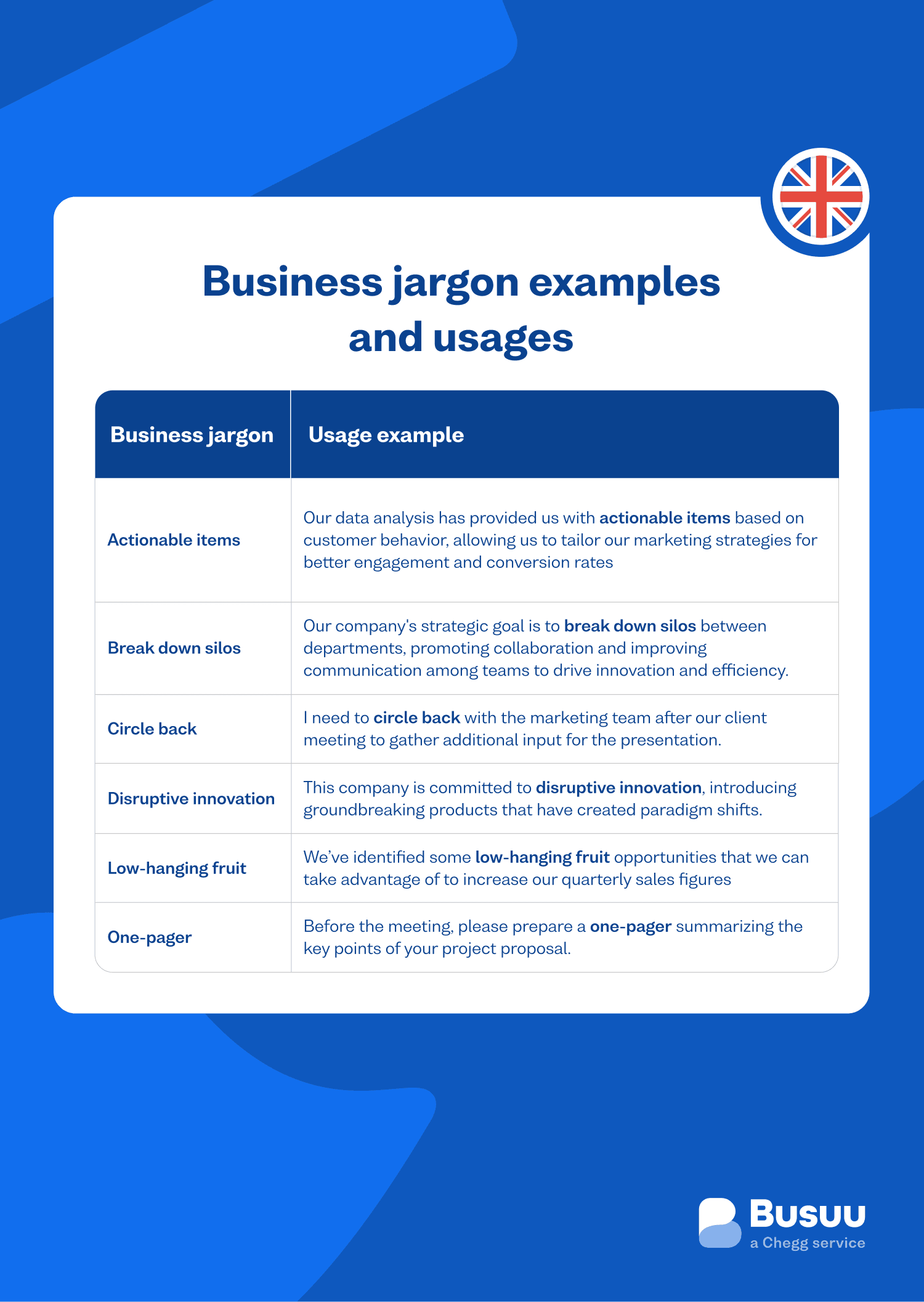I want to learn...
Learning general English is tough enough but let’s say you’ve mastered that and it’s time to start using English professionally. Picture the scene: It’s your first week at your new job working for a multinational corporation. You’re having a ton of fun and learning a lot.
But then you join your first meeting. And words you don’t understand start popping up. Words that sound unnatural and vague. Welcome to the world of business jargon.
Business jargon is common in the corporate world. Let’s take a look at some of the most common business words you’ll hear in the office.
What is business jargon?
Business jargon refers to words that are only used in business contexts. It often contains buzzwords and euphemisms and is often vague. You can think of corporate jargon like this as the slang of the business world.
Examples of business jargon
If you’re going to work in business, you need to understand corporate jargon — you’ll definitely hear a lot of it. But think carefully about whether you use it yourself. It’s often easier for everyone when you use good old plain English.
Here’s a list of the most common business vocabulary you’ll hear in offices today (with examples full of business buzzwords).

1. Actionable items
An actionable item is a task for a person or team to do. In plain English, it’s something on a to-do list.
Usage example: Our data analysis has provided us with actionable insights into customer behavior, allowing us to tailor our marketing strategies for better engagement and conversion rates.
2. Brain dump
A brain dump is when you write down ideas during or after a brainstorming session.
Usage example: After the brainstorming session, let's have a quick brain dump to capture all the ideas and concepts we discussed before we start narrowing down our options.
3. Break down silos
This business jargon means removing barriers and improving efficiency by collaborating and working with other teams or departments.
Usage example: Our company's strategic goal is to break down silos between departments, promoting collaboration and improving communication among teams to drive innovation and efficiency.
4. Circle back
This means to talk about something later. It’s often used as a way to avoid a discussion the speaker isn’t ready (or willing) to do.
Usage example: I need to circle back with the marketing team after our client meeting to gather additional input for the presentation.
5. Disruptive innovation
This means innovation that creates a new market or disrupts an existing market with new products and services.
Usage example: This company is committed to disruptive innovation, introducing groundbreaking products that have created paradigm shifts.
6. Leverage
This term comes from finance where it means using borrowed money to get a higher return from an investment. People in business started to use it to mean to use something to get benefits. For example, using resources, money, and skills to get an advantage.
Usage example: We need to leverage our market research to gain a competitive edge in the industry.
7. Low-hanging fruit
This is business jargon for a corporate goal that can be achieved easily.
Usage example: We’ve identified some low-hanging fruit opportunities that we can take advantage of to increase our quarterly sales figures.
8. Move the needle
This means achieving a big change or improvement.
Usage example: Our new marketing campaign had a big impact and helped move the needle on our quarterly sales.
9. Ninja
A ninja in business is someone who is highly skilled, an expert, and good at their job.
Usage example: We're looking for a marketing ninja who can navigate the digital landscape with expertise, execute creative campaigns, and drive exceptional results for our clients.
10. One-pager
A one-pager is a one-page (corporate jargon can be pretty hard to understand — this one kind of makes sense though) summary of a proposal or report.
Usage example: Before the meeting, please prepare a one-pager summarizing the key points of your project proposal.
11. Paradigm shift
This term comes from science and it means a fundamental change in our understanding. In businesses, it means a profound change in the way a business or society runs.
Usage example: Digital technology has created a paradigm shift in the way we market products.
12. Pivot
People in startups love this buzzword. “Pivot” means changing business strategy based on recent developments.
Usage example: The company decided to pivot from its traditional retail model to an e-commerce-focused strategy.
13. Push the envelope
This simply means to do the best. If a team is pushing the envelope, they’re producing great work. They’re going beyond expectations.
Usage example: Our innovative research and development team continually strives to push the envelope, exploring new technologies and ideas to stay ahead of the competition.
14. Reinvent the wheel
This means to redo something that has already been done or to start again from scratch. It’s often used — like in the example — as a way of saying it isn’t important to do something new.
Usage example: You don't need to reinvent the wheel for this project; leverage existing best practices and tools to streamline the process and save time.
15. Skin in the game
When you have skin in the game, you’re interested in the outcome or results of something. In the example, employees who have skin in the game care about the company’s performance and results so will (theoretically) work harder.
Usage example: Our new incentive program encourages employees to have skin in the game by offering stock options, aligning their interests with the long-term success of the company.
16. Synergy
This means collaboration and cooperation leading to good results. It could be cooperation between teams, groups, or individuals.
Usage example: The upcoming merger with Company X is expected to create significant synergy by combining our respective expertise.
17. Silver bullet
A silver bullet is like a magic shortcut. It’s a quick solution to a complicated and difficult problem.
Usage example: We should keep in mind that there's no single silver bullet solution to the complex challenges we face; it will require a combination of strategies and efforts to achieve our goals.
18. Think outside the box
This business jargon means think creatively from a different perspective.
Usage example: I encourage you to think outside the box and explore innovative ways to solve the problems we’re facing.
19. Throw (someone) under the bus
When you throw an employee or team member under the bus, you blame them for a failure or poor result.
Usage example: The manager chose to throw an individual team member under the bus, blaming them for the project's failure.
20. Trim the fat
This means to cut costs, to reduce unnecessary expenses to save money.
Usage example: In our review, we identified areas where we can trim the fat by streamlining processes and reducing non-essential expenditures.
The problems with using business jargon
Despite the popularity of business jargon, it causes a bunch of problems. Let’s take a look at them in more detail.
Clarity
Business jargon can lead to misunderstandings. There are always simpler phrases to use than business jargon. When you use these simple, straight-to-the-point phrases, your listeners can understand your point immediately. When you use business speak, it can be difficult to understand.
Also, because of the popularity of these buzzwords, people use them incorrectly. They’ve heard them a million times but don’t really understand what they mean. This leads to even more misunderstandings.
Exclusivity
Successful businesses are built on successful teams. But jargon can be a big hurdle for team communication and relationship building. That’s because it’s like an exclusive language. A language only certain people know. New team members can easily feel excluded when they don’t understand the words their team uses.
Authenticity
Business jargon isn’t authentic or natural. It sounds fake. Made up. This can make people — and companies — sound insincere.
Let’s imagine you have a boss who uses lots of jargon. He sounds a bit like a robot. Like he’s trying too hard to show how great he is — we all know this type of person. They use big words to show their superiority. The problem is that his team can’t relax when he’s talking because they can’t relate to him. If he used standard, straight-to-the-point words there’d be no difficulties relating to him.
Business English can feel like a completely different language
There are tons of new words for you to learn. This isn’t easy because business jargon can be hard to understand. With so many idioms and metaphors, the meanings are vague and unclear. But, unfortunately, if you plan to use English in a corporate environment, you need to understand these words.
Whether you use them yourself is a different question. Remember, using plain English is a more efficient (although less fashionable in the business world) way of communicating your message.
AUTHOR

Barney Meekin
Newlanguages


